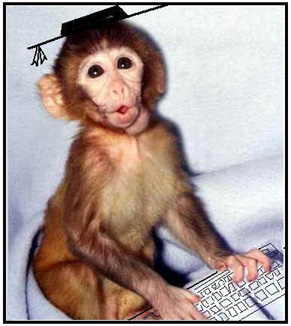Monkeys Make the Grade
College students at Duke University did better than Macaque monkeys at mental arithmetic, says S.Ananthanarayanan.
The December issue of the journal
PLos Biology (Public Library of science) carries a report on the work of Elizabeth Brannon and Jessica Cantlon of the Duke Center for Cognitive Neuroscience, in North Carolina, USA.
That animals have computational abilities has been known but whether this amounted to cognitive ability has been a question. The prevailing view, which
started from the time of Descartes, has been that animals cannot think because they do not use language. The more modern but similar view is of B S Skinner, who considered that animal intelligence could be explained as conditioned response, without the need
for invoking cognition.
This view is now under challenge and the some kinds of complex animal behavior are seen to evidence cognitive ability. One of Skinner’s own students,
Herbert S Terence, professor at Columbia, along with graduate student Elizabeth Brannon, reported strong evidence of complex ability of animals in the October issue of the journal,
Science. 
The duo were able to train monkeys to discriminate computer-generated images containing as many as 9 objects and to respond to them in ascending order,
with a significant success rate. Such behaviour may be motivated by craving for rewards, but it requires thought processes for execution and cannot be explained as conditioned response.
As animals show ability in thought process, Terrence and Brannon hope to go on to show that human intelligence, like other human attributes, may have arisen from animal origins.
Now in the PLos Biology, Dr Brandon has teamed with Dr Cantlon of Duke Center to report a more complex experiment with results not just statistically
significant but comparable to college students’ ability.
There is evidence to show that both humans and animals have the ability to mentally represent and compare numbers. For instance, animals and infants
can discriminate between four objects and eight objects. It has also been shown that crows cana count up to 4. But there has been no evidence so far that animals can perform any kind of operations of arithmetic.
"We know that animals can recognize quantities, but there is less evidence for their ability to carry out explicit mathematical tasks, such as addition,"
said Jessica Cantlon. But the study they now report shows that monkeys can add too.
In the Cantlon-Brannon experiment, macaque monkeys were placed in front of a computer touch screen displaying a number of dots. The screen was then cleared
and replaced with a new screen with a different number of dots. A third screen then appeared displaying two boxes; one containing the sum of the first two sets of dots and one containing a different number. The monkeys were rewarded for touching the box containing
the correct sum of the sets.
It was found that the monkeys got the right answer 76% of the time! The same test was then administered to college students, who had to choose the correct
box of dots without counting the individual dots. Well the college students did a little better, at correct 94% of the time, but the average response time for both monkeys and collegians was about the same one second.
Interestingly, both the monkeys' and the college students' performance worsened when the two choice boxes were close in number.
"If the correct sum was 11 and the box with the incorrect number held 12 dots, both monkeys and the college students took longer to answer and had more
errors. We call this the ratio effect," explained Cantlon. "What's remarkable is that both species suffered from the ratio effect at virtually the same rate." That monkeys display the ability to add suggests that basic arithmetic may be part of the evolutionary
heritage of humans.
On top of this basic ability, humans have added language and writing, which gives humans facility in representing and expressing numbers. "Much of adult humans' mathematical capacity lies in their ability to represent numerical
concepts using symbolic language. A monkey can't tell the difference between 2000 and 2001 objects, for instance. However, our work has shown that both humans and monkeys can mentally manipulate representations of number to generate approximate sums of individual
objects," says Brannon.
[the writer can be contacted at simplescience@gmail.com]